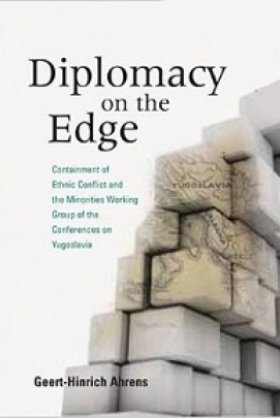Diplomacy on the Edge: Containment of Ethnic Conflict and the Minorities Working Group of the Conferences on Yugoslavia

-
With ongoing war crimes trials, the yet unsettled status of Kosovo, and the odd assortment of new states struggling to create, reorder, and maintain political institutions, economies, and societies, the countries of the former Yugoslavia continue to challenge not only themselves but also the international community. Diplomacy on the Edge tells about the international efforts to mediate the political, economic, and social climate of these countries in 1991–2004 when some of the struggles were deadly. It adds to the literature on peacemaking and offers an important reflection on the future of the Balkans.
Geert-Hinrich Ahrens is uniquely positioned to tell this story. He has traveled widely in the Balkans since the 1950s and speaks four of the regional languages, including fluent Serbo-Croatian. He is also a senior German diplomat who participated in several of the international mediation efforts of the 1990s. An eyewitness to much of the story, he is also familiar with important official documents and archives, and he supports his account through the scholarly literature and the growing library of memoirs of participants. The book focuses on the years 1991–1996 and on the activities of the Minorities Working Group of the Conference on Yugoslavia, headed by the author. The Working Group was the principal UN and European Community diplomatic effort to grapple with ethnic conflicts in the Croatian Krajina, Kosovo, Macedonia, and southern Serbia. Ahrens also provides the general history of the conflicts and brings the story up through 2004.
Geert-Hinrich Ahrens is a German diplomat. He has been Ambassador to Vietnam and to Colombia; from 1992 to 1996 he was ambassador-at-large to the International Conference on the Former Yugoslavia. He was a Fellow at the Woodrow Wilson International Center for Scholars in 2002–3.
Author
Ambassador Geert-Hinrich AhrensFormer Public Policy Scholar;
Lawyer, former Head of OSCE Presence in AlbaniaBrowse Insights & AnalysisExplore More
Browse Insights & Analysis
Iraq Should Consider Extending UNAMI’s Mission
Posted date/time:
Middle East Dialogue February 2025 Meeting Report
Posted date/time:

